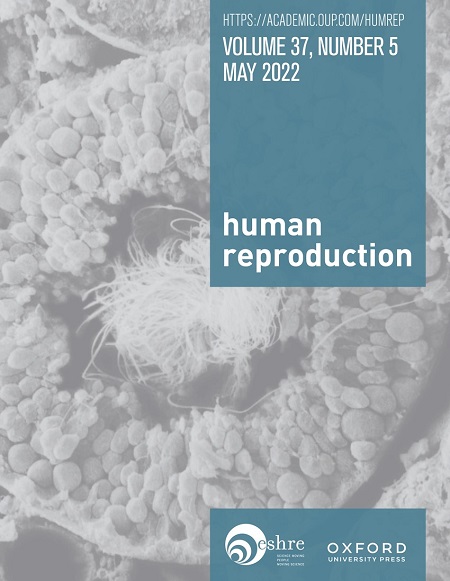P-605 The predictive role of follicle-stimulating hormone receptor polymorphism on letrozole resistance in women with polycystic ovary syndrome
IF 6
1区 医学
Q1 OBSTETRICS & GYNECOLOGY
引用次数: 0
Abstract
Study question Whether follicle stimulating hormone receptor (FSHR) polymorphism can predict letrozole resistance in women with polycystic ovarian syndrome (PCOS) during ovulation induction therapy. Summary answer The Asn/Asn polymorphism at FSHR 680 position and Thr/Thr polymorphism at FSHR 307 position were potential predictors for letrozole resistance in women with PCOS. What is known already Letrozole is an oral medication for ovulation induction, which gradually becomes an essential first-line treatment for anovulatory infertility. However, there are still a proportion of non-responsive cycles during letrozole therapy, which is defined as “letrozole resistance”. Exploring potential markers to predict the ovarian response during ovulation induction will help women with PCOS achieve conception in a shorter time with a lower expense. Previous studies have shown that FSHR polymorphism is associated with ovarian response. However, the relationship between FSHR polymorphism and the ovarian response to letrozole has not been reported. Study design, size, duration This was a retrospective study that included 133 women with PCOS (93 with letrozole response and 40 with letrozole resistance) between January 2021 and May 2024. Participants/materials, setting, methods Data on demographics were collected, and the genotyping of the FSHR single nucleotide polymorphisms (c.2039A>G, rs6166 at position 680, and c.919A>G, rs6165 at position 307) was carried out using the predesigned TaqMan SNP assays. Binary logistic regression model was used for the prediction of FSHR polymorphisms on letrozole resistance. Main results and the role of chance The distribution rate of Asn/Asn polymorphism at position 680 was significantly higher [OR: 1.543 (95% CI, 1.046-2.278), P = 0.013] in letrozole resistance group (57.5%) compared to letrozole response group (34.41%), so as to the distribution rate of Thr/Thr polymorphism at position 307 [57.5% vs. 30.11%; OR: 1.645 (95% CI, 1.120-2.415), P = 0.003]. As a result, significantly more participants with Asn/Asn polymorphism or Thr/Thr polymorphism were resistant to letrozole compared to other polymorphisms. Logistic regression model showed that Asn/Asn polymorphism tended to be a risk factor [OR: 5.227 (95% CI, 0.994-27.490), P = 0.051] for letrozole response, while Thr/Thr polymorphism significantly influenced [OR: 7.04 (95% CI, 1.394-35.559), P = 0.018] letrozole response. Limitations, reasons for caution Our study is limited by the retrospective design and the small sample size, thus additional prospective trials with a larger sample size are needed to verify our findings. In addition, the mechanism on how FSHR genotype affects ovarian response to letrozole treatment needs to be further explored. Wider implications of the findings Our study provided evidence for making individualized ovulation induction strategies according to the FSHR genotypes, which help to better guide the selection of ovulation-induction medications in clinic. Trial registration number NoP-605促卵泡激素受体多态性对多囊卵巢综合征妇女来曲唑耐药的预测作用
促卵泡激素受体(FSHR)多态性能否预测多囊卵巢综合征(PCOS)患者在促排卵治疗期间来曲唑耐药性?FSHR 680位点Asn/Asn多态性和FSHR 307位点Thr/Thr多态性是PCOS患者来曲唑耐药的潜在预测因子。来曲唑是一种口服促排卵药物,逐渐成为无排卵性不孕症的重要一线治疗药物。然而,在来曲唑治疗期间仍有一定比例的无反应周期,这被定义为“来曲唑耐药”。探索潜在的标志物来预测卵巢在促排卵过程中的反应,将有助于PCOS女性在更短的时间内以更低的费用实现受孕。已有研究表明FSHR多态性与卵巢反应有关。然而,FSHR多态性与卵巢对来曲唑反应之间的关系尚未见报道。这是一项回顾性研究,纳入了2021年1月至2024年5月期间133名PCOS患者(93名来曲唑有反应,40名来曲唑耐药)。收集人口统计学数据,采用预先设计的TaqMan SNP分析方法对FSHR单核苷酸多态性(c.2039A>;G, 680位点rs6166; c.919A>;G, 307位点rs6165)进行基因分型。采用二元logistic回归模型对来曲唑耐药FSHR多态性进行预测。来曲唑耐药组(57.5%)Asn/Asn多态性在680位点的分布率显著高于来曲唑应答组(34.41%)[OR: 1.543 (95% CI, 1.046 ~ 2.278), P = 0.013],而来曲唑307位点的Thr/Thr多态性分布率[57.5%∶30.11%];Or: 1.645 (95% ci, 1.120-2.415), p = 0.003)。结果,与其他多态性相比,Asn/Asn多态性或Thr/Thr多态性的参与者对来曲唑的抗性明显更多。Logistic回归模型显示,Asn/Asn多态性是来曲唑反应的危险因素[OR: 5.227 (95% CI, 0.994-27.490), P = 0.051],而Thr/Thr多态性对来曲唑反应有显著影响[OR: 7.04 (95% CI, 1.394-35.559), P = 0.018]。我们的研究受到回顾性设计和小样本量的限制,因此需要额外的更大样本量的前瞻性试验来验证我们的发现。此外,FSHR基因型影响卵巢对来曲唑治疗反应的机制有待进一步探讨。本研究为根据FSHR基因型制定个体化促排卵策略提供了依据,有助于更好地指导临床促排卵药物的选择。试验注册号
本文章由计算机程序翻译,如有差异,请以英文原文为准。
求助全文
约1分钟内获得全文
求助全文
来源期刊

Human reproduction
医学-妇产科学
CiteScore
10.90
自引率
6.60%
发文量
1369
审稿时长
1 months
期刊介绍:
Human Reproduction features full-length, peer-reviewed papers reporting original research, concise clinical case reports, as well as opinions and debates on topical issues.
Papers published cover the clinical science and medical aspects of reproductive physiology, pathology and endocrinology; including andrology, gonad function, gametogenesis, fertilization, embryo development, implantation, early pregnancy, genetics, genetic diagnosis, oncology, infectious disease, surgery, contraception, infertility treatment, psychology, ethics and social issues.
 求助内容:
求助内容: 应助结果提醒方式:
应助结果提醒方式:


